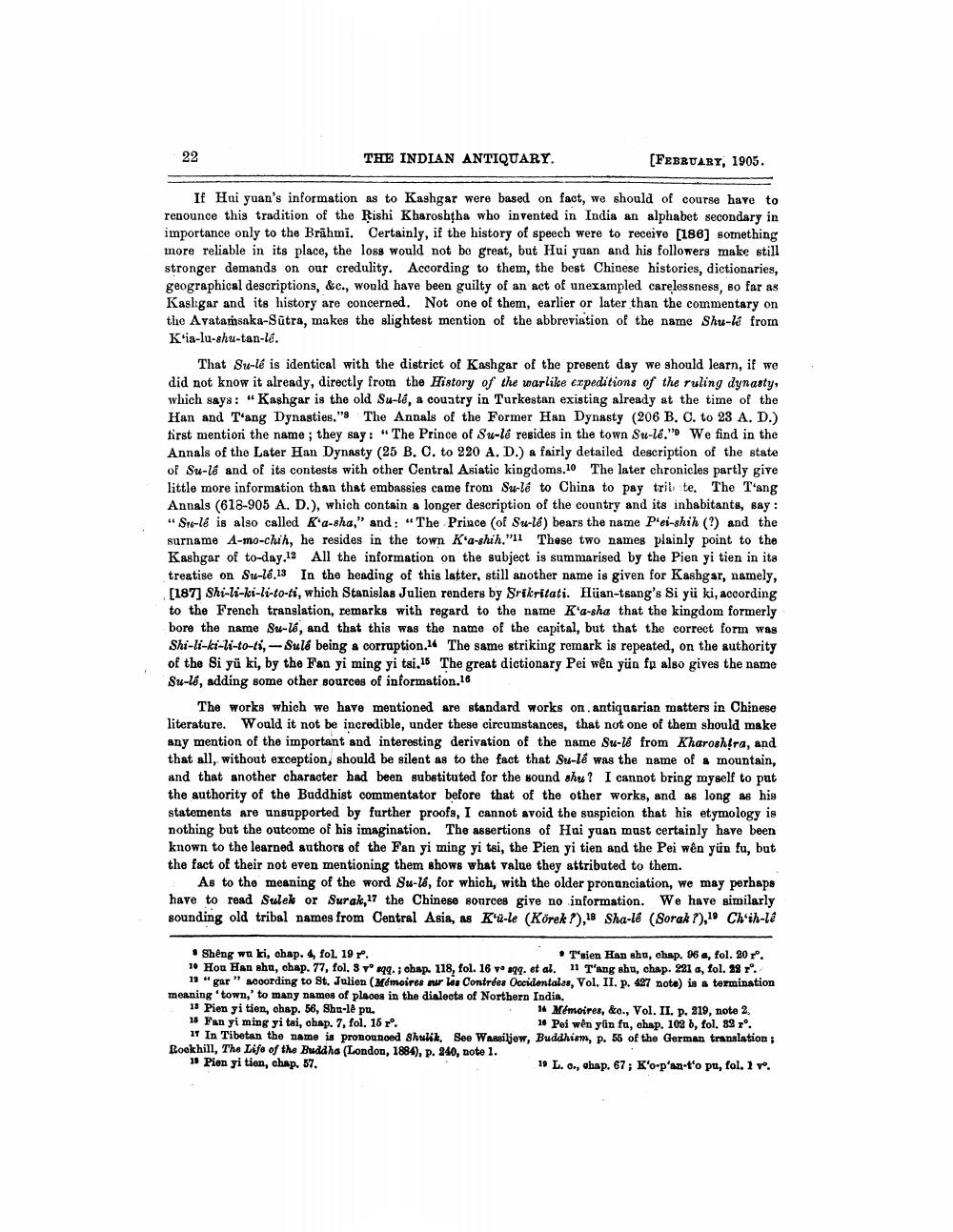________________
22
THE INDIAN ANTIQUARY.
(FEBRUARY, 1905.
If Hui yuan's information as to Kashgar were based on fact, we should of course have to renounce this tradition of the Rishi Kharoshtha who invented in India an alphabet secondary in importance only to the Brāhmi. Certainly, if the history of speech were to receive (186) something more reliable in its place, the loss would not be great, but Hui yuan and his followers make still stronger demands on our credulity. According to them, the best Chinese histories, dictionaries, geographical descriptions, &c., would have been guilty of an act of unexampled carelessness, so far as Kashgar and its history are concerned. Not one of them, earlier or later than the commentary on the Avatamsaka-Sutra, makes the slightest mention of the abbreviation of the name Shu-ld from K'ia-lu-shu-tan-lé.
That Su-lé is identical with the district of Kashgar of the present day we should learn, if we did not know it already, directly from the History of the warlike expeditions of the ruling dynasty, which says: "Kashgar is the old Su-lé, a couatry in Turkestan existing already at the time of the Han and Tang Dynasties." The Annals of the Former Han Dynasty (206 B. C. to 23 A. D.) first mention the name; they say: "The Prince of Su-lé resides in the town Su-lé." We find in the Annals of the Later Han Dynasty (25 B. C. to 220 A, D.) a fairly detailed description of the state of Su-lé and of its contests with other Central Asiatic kingdoms.10 The later chronicles partly give little more information than that embassies came from Su-lé to China to pay tril, te. The T'ang Annals (618-905 A. D.), which contain a longer description of the country and its inhabitants, say: "Src-lé is also called K'a-sha," and "The Prince of Su-lé) bears the name Pei-shih (?) and the surname A-mo-chih, he resides in the town K'a-shih,"ll These two names plainly point to the Kashgar of to-day.12 All the information on the subject is summarised by the Pien yi tien in its treatise on Su-l6.13 In the heading of this latter, still another name is given for Kashgar, namely, [187] Shi-li-ki-li-to-ti, which Stanislas Julien renders by Srikritati. Hüan-tsang's Si yü ki, according to the French translation, remarks with regard to the name K'a-sha that the kingdom formerly bore the name Su-l, and that this was the name of the capital, but that the correct form was Shi-li-ki-li-to-ti, -Sulé being a corruption. The same striking remark is repeated, on the authority of the Si yü ki, by the Fan yi ming yi tsi.16 The great dictionary Pei wên yün fu also gives the name Su-lé, adding some other sources of information.16
The works which we have mentioned are standard works on antiquarian matters in Chinese literature. Would it not be incredible, under these circumstances, that not one of them should make any mention of the important and interesting derivation of the name Su-T& from Kharoshtra, and that all, without exception, should be silent as to the fact that Su-lé was the name of a mountain, and that another character had been substituted for the sound shu? I cannot bring myself to put the authority of the Buddhist commentator before that of the other works, and as long as his statements are unsupported by further proofs, I cannot avoid the suspicion that his etymology is nothing but the outcome of his imagination. The assertions of Hai yuan mast certainly have been known to the learned authors of the Fan yi ming yi tsi, the Pien yi tien and the Pei wên yün fu, but the fact of their not even mentioning them shows what value they attributed to them.
As to the meaning of the word Su-l, for which, with the older pronunciation, we may perhaps have to read Sulek or Surak, 17 the Chinese sonrces give no information. We have similarly sounding old tribal names from Central Asia, as K'a-le (Körek ?),19 Sha-lê (Sorak 7),19 Ch'ih-lé
• Shêng wu ki, chap. 4, fol. 19 r.
• Tsien Han sha, chap. 96 a, fol. 20 r. 10 Hou Han sha, chap. 77, fol. 3 ° 199., chap. 118, fol. 16 v 99. et al. 11 Tangshu, chap. 221 a, fol. 28 r.
11 "gar" according to St. Julion (Mémoires nur los Contrdes Occidentales, Vol. II. p. 427 note) is a termination meaning 'town,' to many names of places in the dialoots of Northern India. 11 Pien yi tien, chap. 56, Sha-lê pu.
A Mémoires, &o., Vol. II. p. 319, note 2 15 Fan yi ming yi tai, chap. 7, fol. 16 ro.
16 Pei wên yün fa, chap. 102 b, fol. 82 r. IT In Tibetan the name is pronounced Shulik. See Wassiljew, Buddhism, p. 56 of the German translation; Rockhill, The Life of the Buddha (London, 1884), p. 240, note 1. 16 Pien yi tien, chap. 57.
19 L. 6., chap. 67; K'o-p'an-t'o pu, fol. 1 r.




